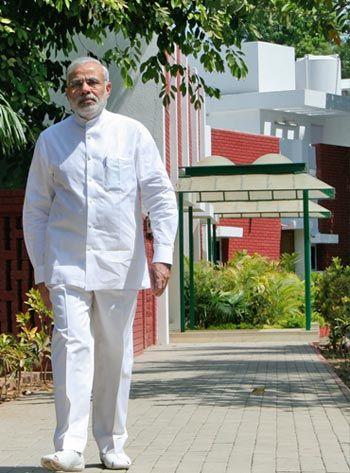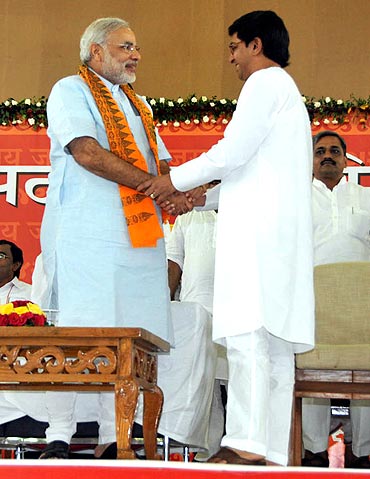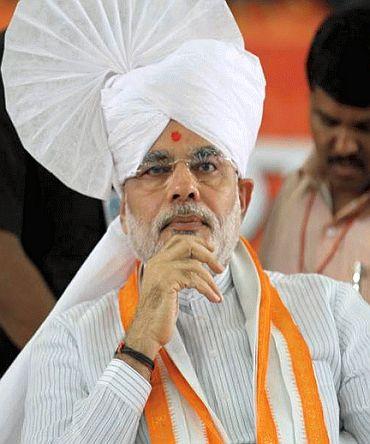
Indias plurality often teaches politicians lessons that they might not otherwise learn, says Neerja Chowdhury.
The Bahujan Samaj Party which once used to thrive on the slogan, 'Tilak tarazu aur talwar, Inko maro joote char', had to give way to the more inclusive slogan, 'Hathi nahin, Ganesh hai, Brahma Vishnu Mahesh hai'. The first slogan helped the party mobilise dalits against the upper castes, and bring them under the BSP banner. But when it came to making a bid for power, the BSP which could not win elections only on the strength of the dalits, was compelled to reach out to those very upper castes it had despised.
So also is the case with Narendra Modi. The Godhra riots may have helped him win the 2002 elections in Gujarat. But now that he has national ambitions, he needs to make a "sadbhavana" pitch to garner wider support. Call the change tactical or otherwise, it is Indias diversity -- and democracy -- which brings it about.
Narendra Modi is known for his astute sense of political timing. He lost no time, seizing the opportunity provided him by the Supreme Court, to turn the situation to his advantage, catching even his party colleagues by surprise.
...

With his recently concluded "upvas" for "peace and harmony" in Ahmedabad, Modi has projected himself as a serious contender for the top job in Delhi, even as a defensive Bharatiya Janata Party continued to repeat ad nauseum that it would not project its prime ministerial candidate before the 2014 elections.
Senior party leaders beat a path to his 'anshan' door in Ahmedabad, some calling him prime minister material. In one swift stroke, he managed to fast forward events that might have taken place after the Gujarat elections next year, if he were to win for the third time.
He also managed to get several of the BJP's allies to come out openly in his support, barring the Janata Dal-United, which criticised him sharply. They included old allies Akali Dal, Shiv Sena though it flayed his tilt towards Muslims, and new friends Raj Thackeray, and Jayalaltihaa who enjoys a rare rapport with him. The Telugu Desam Party and the Biju Janata Dal have maintained a studied silence, as both wait and watch how the situation develops.
Modi also managed to create the atmospherics to impress the trial court about his growing importance nationally. As of now, he is not named in any first information report, and much to his relief, the Supreme Court has left it to the trial court to decide whether he should be named as a conspirator in the 2002 killing of former Congress member of Parliament Ehsan Jaffri and others in the gruesome Gulbarg Society case.
...

Above all, Modi's 'sadhbhavana' mission was his first salvo aimed at the impending state elections, which is the first hurdle he has to cross. He may well advance the assembly polls, otherwise due in December 2012, when he is expected to make a bid for the BJP presidentship, a stepping stone for the larger role he obviously sees for himself.
His success or otherwise will depend on several factors, the foremost being the stance the Rashtriya Swayamsevak Sangh takes on his candidature for the top job. A section of the Sangh has not been happy with his style of functioning or the way he has become larger than the party in Gujarat. Some were quick to criticise the way he went overboard to "appease" Muslims at his anshan. Realising what was at stake, he moved quickly to make amends -- and did so by refusing to wear the cap offered to him by a Muslim well-wisher who came to greet him at the dais.
And yet, there is another view inside the RSS, that he could be the BJP's best bet in the given situation. The RSS may calculate that, in the given situation, it would be easier to market Modi, than the BJP as a party, which has not yet managed to come across as a credible, saleable alternative to the Congress.
If the Sangh backs Modi's candidature, the BJP, despite the reservations of its senior leaders, may have to fall in line. Though LK Advani has also virtually thrown his hat in the ring by announcing his rath yatra against corruption, the RSS is hoping that the party veteran will pull out of the PM race.
...

The other imponderable is the impact Modi would have outside Gujarat. Would he have an appeal in the south? Or in the east of the country? Even in the Hindi heartland, would he evoke a response in Uttar Pradesh and in Bihar? So far, he had not been able to make that kind of an impact, when he went to campaign for the party in different states.
Modi is known as a strong leader, who works 16 hours a day, who has no corruption charges against him so far, and no family which could misuse his official position to line its coffers, who is also backed by corporate India for PM, and has 11 percent growth story to his credit. And now the United States Congressional Research Service also views him as a possible PM in 2014. Could the urban middle class, increasingly disenchanted with the United Progressive Alliance and tired of corruption and a weak national leadership, look at Modi as the leader who may fulfil their dreams?
He has the 2002 riots blot against him, but would they be willing to overlook that in the given situation? That is obviously what he is banking on. Hence, the sadbhavna mission, to indicate by innuendo that he wants to play a more inclusive game now.
He is clearly targeting this urban middle class constituency -- beyond the BJP's hardcore support base -- which had swerved towards Atal Bihari Vajpayee in the 'ab ki baari Atal Bihari' 1998 election, and made a difference. But then, Vajpayee had a moderate face all his life. Modi does not sport that image. Nor for that matter did LK Advani will find it difficult to forget and forgive 2002 or to trust so easily -- nor for that matter, only the National Democratic Alliance allies, present and potential. It is the fence-sitting, non-hardcore Hindus whose support he is aiming to secure.
It goes without saying that much will also hinge on how the Congress and the UPA play their cards in the weeks and months to come.